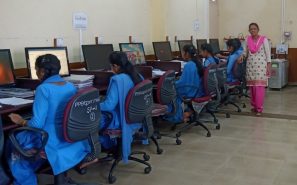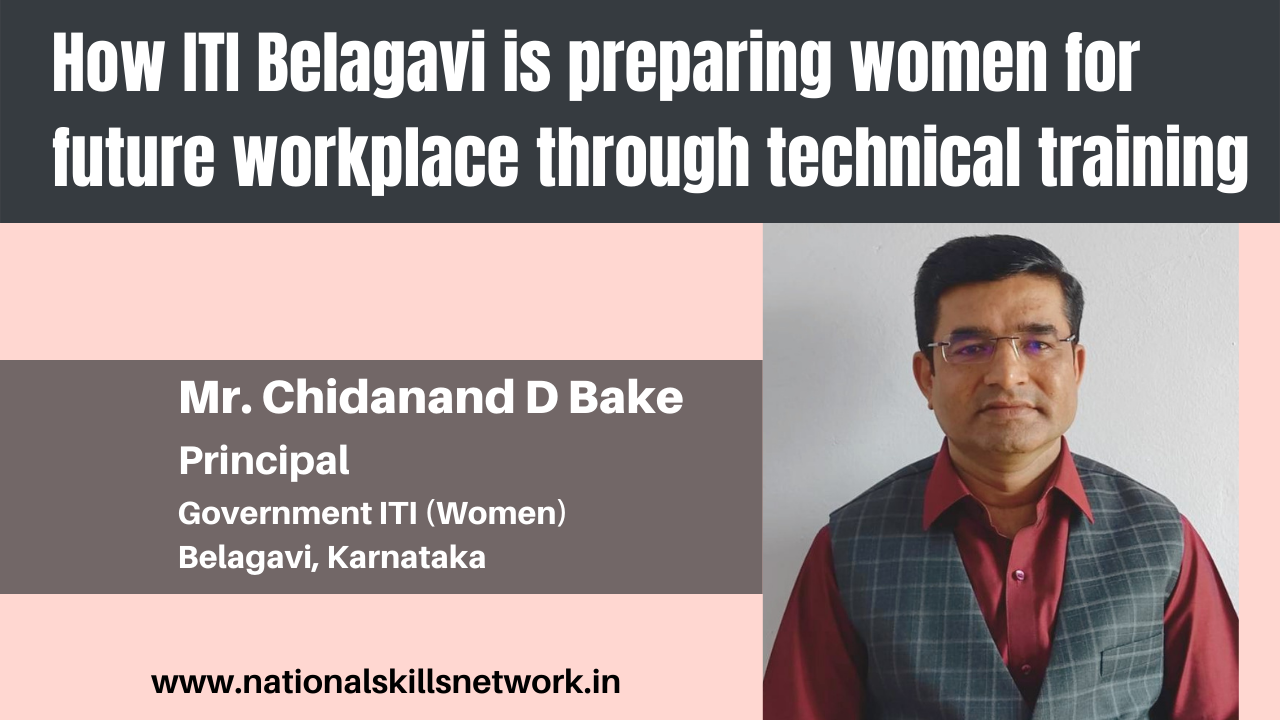There is no gender bias when it comes to learning a skill. Regardless of the circumstances, women can learn and practise technical skills just as well as men. The Government of Karnataka has established an ITI in Belagavi that provides superior training to women in various trades in order to help them become economically self-sufficient. ITI Belagavi is a pioneer in training girls in industry-required trades and providing them with employment opportunities.
To learn more about the importance of skilling and training for women, Team NSN conversed with Mr. Chidanand D Bake, Principal, Government ITI Belagavi (Women), Karnataka who shared more about the ITI, their industry-aligned courses and initiatives.
This interview is facilitated by Quest Alliance.
Below are a few excerpts from our conversation. You can watch the full video on our YouTube channel.
Q. What is unique about ITI Belagavi and what are the popular courses?
 A: ITI Belagavi, which was founded in 1984, is a women-only institute. Electronics, mechanics, and computer science were the first three trades to be introduced. Since 2008, under the PPP Scheme, we are offering Fitter, Electrician, Mechanical Diesel and Motor Mechanic Vehicle. The ITI has grown from 100 to 300 members as a result of the increase in trades.
A: ITI Belagavi, which was founded in 1984, is a women-only institute. Electronics, mechanics, and computer science were the first three trades to be introduced. Since 2008, under the PPP Scheme, we are offering Fitter, Electrician, Mechanical Diesel and Motor Mechanic Vehicle. The ITI has grown from 100 to 300 members as a result of the increase in trades.
In Karnataka, our institute is the 1st institute to implement the (DST) “Dual System of Training”. We have started this in Fitter as well as Electrician. Electronic and mechanical engineering are the most popular disciplines for women, with an 85-90 per cent placement rate.
Q. Do you see industry acceptance for girls in job roles pertaining to Electrical, Welding and other non-conventional skills?
A: Female candidates are now preferred by employers, and the government of Karnataka has made it necessary to have at least 33% of women in the workforce. Female candidates are in high demand for trades like testing and qualitative analysis.
Q. What is the advantage of the ITI situated near an industrial area? Please tell us more about the industry participation and contribution to your ITIs?
A: In Belagavi, we are surrounded by significant industries, which helps us gain industry input on our training curriculum. Industry experts come to our ITI on a regular basis to interact with the teachers and students. In 2016, we implemented the Dual System of Training (DST), in which students study for one year at ITI and then receive on-the-job training in the industry for the next nine to twelve months.
We send trainees to industries for on-the-job training. Industries are looking for students who have graduated to work as apprentices for a year. Every year, we also host the Apprenticeship Mela, where over 100 students are recruited.
Q. What are some of the key areas where collaboration with industry has improved things?
A: When we sign a Memorandum of Understanding with the industries for a dual system of training, we observe a shift. Students practise hands-on learning, which greatly benefits them. Industries hire students without training once they complete their ITI programme because they have already worked for six to nine months. ITI, Belagavi, intends to develop a dual system for all trades in response to demand.
 Q. How does an ITI work if the Dual System of Training (DST) is not followed?
Q. How does an ITI work if the Dual System of Training (DST) is not followed?
A: Students learn theoretically and practically throughout the course of two years or one year at ITI. They work as apprentices/interns in the industries after graduation. Students can learn one year in ITI and work another year in industry in the dual system, which can be a win-win situation for both industry and ITI. In the dual system for trainees, there is also freedom in learning and working for the training curriculum. The Government of Karnataka, on the other hand, has mandated that the dual system be implemented in all ITIs.
Q. What are the challenges ITI, Belagavi have faced during the COVID-19 pandemic? How did you manage to adapt to the technology?
A: To overcome the hurdles and assure continued skill development during the pandemic, we have begun offering online classes to our students. Bharat skill training is an initiative that sends kids relevant videos through which they can study. We had issues with pupils in rural places not having access to smartphones, networks, or charging stations. So this year, we aided them by recharging their phones.
Q. Can you share your specific achievements with our audience?
A: Belagavi ITI is the first government-run ITI to receive ISO accreditation in 2013. In 2012, it became the first government ITI to begin PCB design in manufacturing and training. ITI Belagavi holds the distinction of being the first ITI to implement a dual system of training. The Ministry of Skill Development, Government of India, has recognised me as the finest principal. The nation-builder award was also given to our ITI. We developed a solar museum through which we offer renewable energy diploma courses as well as short-term training for MTech students.
Q. How do you show a career path for students to reach higher education and jobs?
A: Choosing to learn in an ITI can have a significant professional benefit. After graduating from ITI, students might establish their own industry or business. The demand for expertise outnumbers the demand for trade. The industry-aligned courses are preparing our students for the future of the workforce by ensuring their industry readiness.
Also read: Government ITI for Women Thane: Breaking barriers in technical education and training https://nationalskillsnetwork.in/government-iti-for-women-thane-breaking-barriers-in-technical-education-and-training/
Q. Do you want to share anything else on the importance of technical education and training in the shaping up of the future?
A: We must bridge the gap between industry and academics by providing students with training that meets industrial needs. I’d like to ask the industry to share what new skills they’ll require so that ITI can incorporate them into training. They should also guarantee 80 percent placement. The Government of Karnataka, on the other hand, has inked an MoU with Tata Technologies under which we would jointly upgrade 150 ITIs. These ITIs are equipped with the necessary technology and training curriculum for industry-required courses including artificial intelligence, electric vehicles, and others.
Q. Please tell us more about your partnership with various industries?
A: Many industries have signed Memorandums of Understanding (MoU) with ITI, Belagavi, for on-the-job training, dual system training, and industrial visits. Industry partners with us to provide training and stipends to our students.














Comments 1